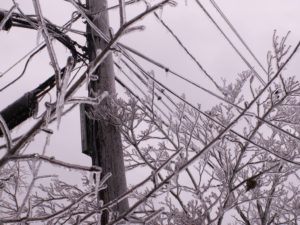 Winter Brings Added Risks
Winter Brings Added Risks
Ice storms, subzero temperatures, and wind can cause unexpected power outages during the winter months. Not having electricity in cold weather can be much more than an inconvenience. Worst case scenario? You and your family might need to find another place to stay to keep warm. If you are faced with a short-term outage, there are things you can do to be better prepared and make sure your family is comfortable.
Essential Supplies
Check and restock your emergency kit with basic supplies like flashlights, batteries, extra nonperishable food and water, cash, and medications and toiletries. Keeping a designated container stocked and ready means that you won’t be wondering where you put the flashlight when the lights are already out. If you have separate cellphone batteries that you use on the go, keep them available and charged when the weather gets iffy.
A Technology Plan
We don’t realize how much we depend on electricity until it’s out, especially when it comes to the Internet and electronic devices used for health, cooking and communication. If you still own a landline-connected phone, you might be able to call out during a local power outage. And you will be able to use a cellphone as long as you have battery power, or a car charger.
Once the power goes out, unplug all televisions, appliances and computers to avoid damage from a power surge when electricity is restored. Leave a light on so you know when the power is back up.
Keep Food Cold
If a bad storm is predicted and you feel that a power outage is likely, adjust your freezer and refrigerator temperatures to their coldest settings, to keep the spaces colder longer if the electricity is off. For long-term outages, try to open the refrigerator door as little as possible to keep in the cold, and eat perishable items first. It’s not recommended that you store milk or other perishable food outdoors, even if it’s very cold, as temperatures will fluctuate.
Stay Warm
You should have hot water for a few hours after the power goes out, even if it’s an electric heater. So if you are really cold, take a hot shower and dress in layers. Most people who use pellet stoves or wood burning fireplaces have a ready stockpile of wood, but definitely lay in some extra firewood or other fuel if a serious storm is on the way. Never rely on kerosene heaters, barbecues or other outside heaters or cook tops to heat your home, as you could put your family at risk for a fire or carbon monoxide poisoning.
Be Ready to Seek Shelter
Keep your car’s gas tank at least half full when an ice storm is predicted. And if you have an electric garage door opener, make sure you know how to operate it manually. Having cash on hand will ensure that you can buy what you need during a regional power outage when electronic payment systems might not be working. If your heat is out temporarily and blankets aren’t doing the trick, visit a family member or friend who has power, or get warm at a local mall or museum until electricity is restored.

